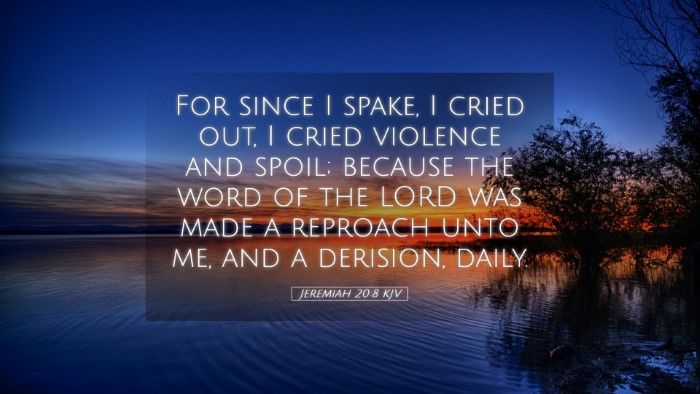Commentary on Jeremiah 20:8
Jeremiah 20:8 states:
"For whenever I speak, I cry out, I shout, 'Violence and destruction!' For the word of the Lord has become for me a reproach and derision all day long." (ESV)
Introduction
In this verse, we find the prophet Jeremiah expressing the deep anguish of his calling and the bitterness he feels from his prophetic ministry. This commentary combines insights from renowned public domain commentators to explore the theological and practical implications of this verse.
Contextual Background
Jeremiah served as a prophet during a turbulent time in the history of Judah. His prophetic messages often involved warnings of impending judgment due to the people's unfaithfulness to God. This context of calamity causes the prophetic voice to be seen as a source of reproach, particularly in a society that preferred peace and comfort over the hard truths of divine judgment.
Analysis of the Text
1. The Burden of Prophecy
According to Matthew Henry, the phrase "For whenever I speak, I cry out..." reflects the intensity of Jeremiah's calling. He sees his role not merely as a communicator of God's word but as one who bears the heavy burden of judgment upon the people:
- Intensity of Emotion: Jeremiah's words are marked by emotional turmoil, as he is compelled to cry out amidst violence and destruction.
- Experience of Reproach: The prophet laments that his messages, rather than being received warmly, result in ridicule, echoing the plight of many who stand as witnesses against societal norms.
2. The Role of the Prophet
Albert Barnes emphasizes that prophetic ministry often brings isolation and misunderstanding. The prophet’s messages serve a higher purpose, but come at the cost of personal suffering:
- Witness to Injustice: Jeremiah's call to declare "violence and destruction" was a response to the moral decay of the society around him.
- Path of Sorrow: The reproach felt by Jeremiah indicates that true prophetic ministry is frequently at odds with popular sentiment, leading to derision and scorn.
3. Theological Implications
Adam Clarke brings a theological perspective, examining how the word of the Lord transforms into a "reproach and derision." Clarke notes the essential suffering of the faithful:
- The Nature of God's Message: The declaration of judgment is a reflection of God’s holy nature and commitment to righteousness.
- Transformation in Society: Jeremiah’s lament demonstrates the need for a societal reformation, highlighting that true prophecy often calls for repentance that is met with hostility.
Practical Applications
1. Endurance in Ministry
The struggles experienced by Jeremiah can offer encouragement to modern ministers enduring ridicule for holding to biblical truths. Pastors and theological students are reminded that:
- Faithfulness may often lead to feelings of isolation.
- Understanding that a prophetic message may not always lead to immediate acceptance.
2. The Cost of Following God
Jeremiah's experience urges leaders to recognize the price of speaking truth to power. True integrity and commitment to God's word can lead to:
- Courage in the face of opposition.
- A deeper appreciation for the prophetic voice in their own lives and ministries.
3. Encouragement to the Afflicted
Followers of Christ who feel ridiculed or neglected due to their faith can find solace in Jeremiah's lament. His story exemplifies that:
- Struggles in faith are not a sign of God's absence.
- Affliction can serve as preparation for the divine calling ahead.
Conclusion
Jeremiah 20:8 serves as a powerful reminder of the dual nature of prophetic ministry—the call to declare God's truth and the ensuing suffering that often accompanies it. The insights from historical commentators provide a rich tapestry of understanding that deepens our appreciation for the struggle involved in faithfully speaking God's word.
Through the lens of Jeremiah, modern believers are encouraged to remain steadfast in their faith, understanding that although the path may be fraught with challenges, it is ultimately aligned with God's greater narrative of redemption.


